Blue light blocking glasses are designed to filter harmful blue light emitted from digital screens and artificial lighting. They work by using advanced lens technology that reduces glare and improves visual clarity, which helps alleviate digital eye strain. Research suggests these glasses can enhance sleep quality by minimizing blue light exposure, especially in the evening. While they provide significant relief for extended screen users, it's important to combine them with good habits, like taking regular breaks. Understanding how these glasses fit into your lifestyle can help you make an informed choice about eye health.
Key Takeaways
- Blue light blocking glasses filter harmful blue light emitted from screens and artificial lighting to reduce eye strain and discomfort.
- They are available in prescription and non-prescription options, designed to improve visual clarity during extended screen use.
- Scientific studies suggest they may help alleviate digital eye strain and improve sleep quality by reducing evening blue light exposure.
- Users often report enhanced comfort and reduced fatigue when wearing these glasses during prolonged digital activities.
- However, they should not replace good habits like regular breaks and ergonomic adjustments for optimal eye health.
Understanding Blue Light
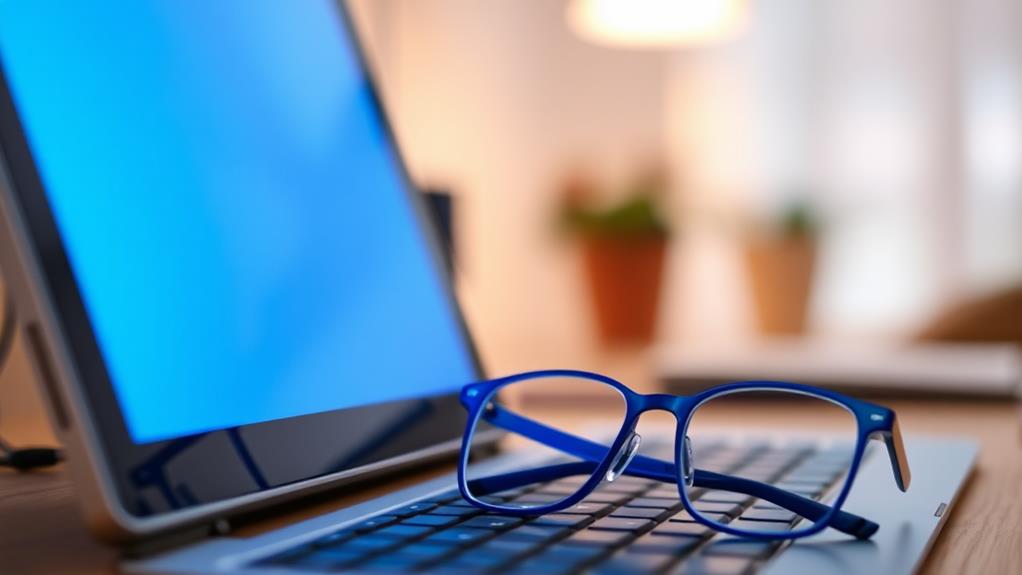
Many people mightn't realize that blue light is a high-energy visible light with a wavelength of approximately 380 to 500 nanometers. This part of the color spectrum plays an essential role in visual perception, influencing how you see and interact with your environment.
Blue light is emitted by various sources, including the sun, LED screens, and fluorescent lighting. Understanding its effects can help you make informed choices regarding your eye health.
You're likely aware that blue light exposure has increased dramatically in recent years due to the prevalence of digital devices. As you spend hours staring at your computer, tablet, or smartphone, you're absorbing more blue light than ever before.
This exposure can lead to digital eye strain, which may manifest as discomfort, blurred vision, or headaches.
Research suggests that excessive blue light exposure, particularly in the evening, can interfere with your sleep patterns by disrupting melatonin production. By gaining insight into blue light's role in your daily life, you can take proactive steps to protect your vision and overall well-being.
Incorporating habits like taking regular screen breaks, adjusting your device settings to reduce blue light emission, or wearing blue light blocking glasses can help mitigate its effects.
The Science Behind Blue Light

Understanding the science behind blue light requires examining its unique properties and effects on our eyes and body. Blue light is part of the visible light spectrum, characterized by short wavelengths and high energy. It ranges from about 380 to 500 nanometers and is emitted by various sources, including the sun, LED screens, and fluorescent lighting.
While natural exposure to blue light during the day helps regulate your circadian rhythm, excessive exposure, particularly from digital devices, can lead to issues like digital eye strain.
Digital eye strain, often referred to as computer vision syndrome, manifests through symptoms such as dryness, irritation, blurry vision, and headaches. These symptoms arise because blue light can cause your eyes to work harder, particularly during prolonged screen time. The high energy of blue light scatters more than other wavelengths, making it harder for your eyes to focus and leading to fatigue.
Research indicates that blue light exposure can also disrupt your sleep patterns. When you use screens late at night, the blue light emitted can inhibit melatonin production, the hormone responsible for regulating sleep. This can lead to difficulties in falling asleep and overall sleep quality.
As you learn more about blue light, remember its dual nature. While it plays a vital role in your daily life and well-being, managing exposure, especially from digital sources, is essential to maintaining eye health and comfort.
Understanding these aspects allows you to take proactive steps in protecting your vision in an increasingly digital world.
What Are Blue Light Blocking Glasses?
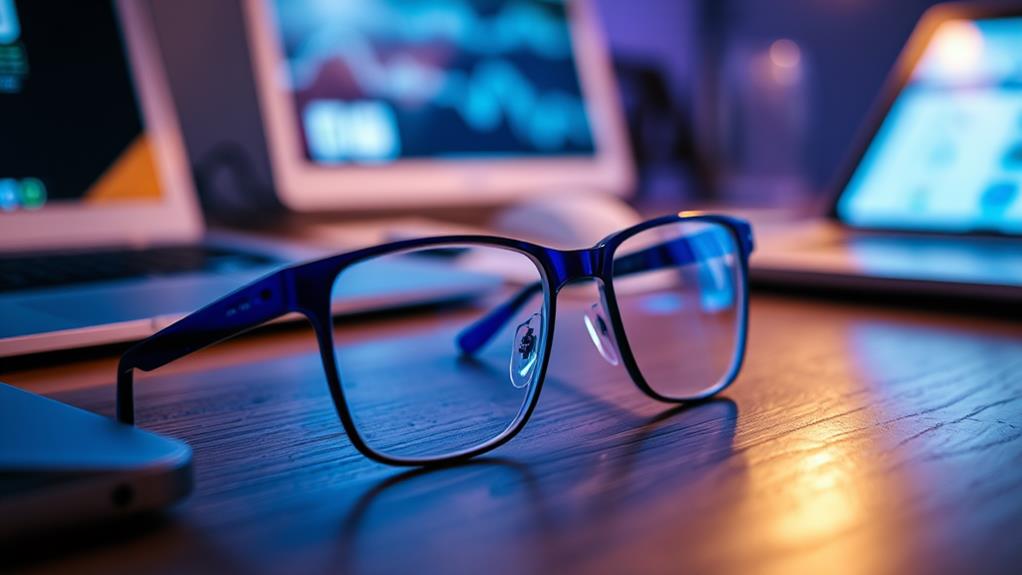
Blue light blocking glasses are designed to filter out harmful blue light emitted from screens and artificial lighting, helping to reduce eye strain and improve sleep quality.
These glasses come with various types of lenses, each tailored to specific needs, such as prescription lenses or non-prescription options.
Purpose of Blue Light
As digital screens have become integral to daily life, the purpose of blue light blocking glasses has gained significant attention. You might be surprised to know that blue light, emitted from various sources like smartphones, tablets, and LED lights, plays a vital role in regulating your sleep-wake cycle and mood.
However, extended blue light exposure can lead to discomfort and potential eye strain.
Consider the following effects of blue light:
- Increased Alertness: Blue light can help you feel more awake, which is beneficial during the day.
- Sleep Disruption: Excessive exposure, especially in the evening, can hinder your ability to fall asleep by disrupting melatonin production.
- Digital Eye Strain: Prolonged screen time can result in symptoms like dryness, fatigue, and blurred vision.
Understanding these factors is essential. Blue light blocking glasses are designed to filter out this high-energy light, potentially reducing discomfort and improving your overall visual experience.
Types of Lenses
While many people recognize the importance of blue light blocking glasses, not all lenses are created equal. You'll find various types of lenses designed to meet different needs and preferences.
Lens materials play an essential role; polycarbonate and high-index plastic are popular for their durability and lightweight properties. Additionally, lens coatings can enhance functionality, providing anti-reflective and scratch-resistant features.
If you wear prescription glasses, you'll be pleased to know there are prescription options available that incorporate blue light filters, ensuring you don't compromise on vision clarity.
Fashion styles also matter, as many brands offer trendy frame designs that suit your personal aesthetic. You can choose from various lens tints that not only block blue light but also provide UV protection, making them a smart choice for outdoor wear.
The right combination of lens tints and coatings can greatly improve your visual comfort, especially during long hours in front of screens.
Ultimately, selecting the right blue light blocking glasses involves considering the interplay of lens materials, coatings, and styles to find a pair that fits both your lifestyle and fashion sense.
How Do They Work?
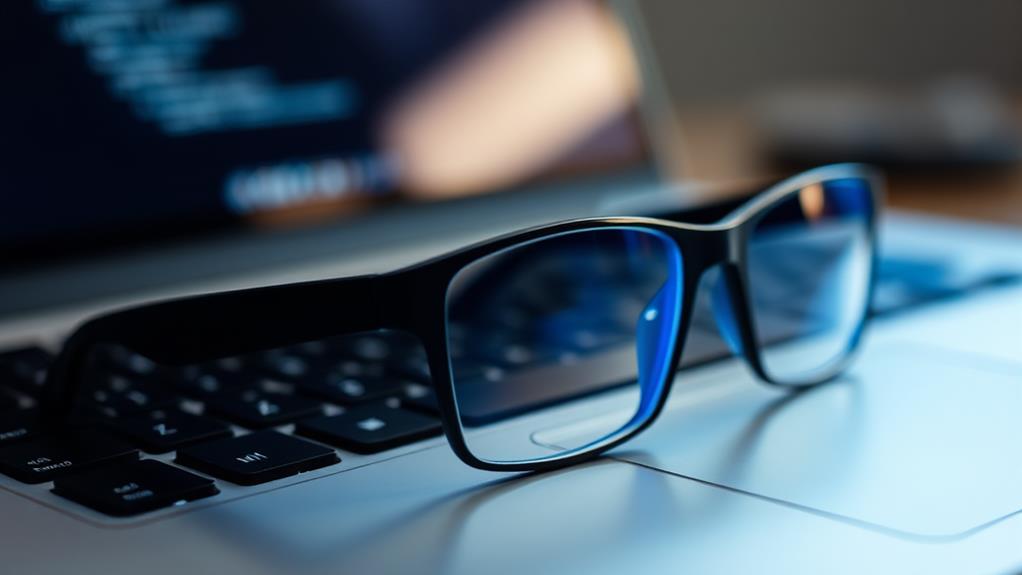
Light waves emitted from screens can disrupt your circadian rhythm and cause digital eye strain. Blue light blocking glasses utilize advanced lens technology to filter out these disruptive wavelengths, promoting visual comfort. By incorporating special coatings or materials, these glasses can effectively reduce the amount of blue light that reaches your eyes, enabling you to work or play on screens for extended periods without discomfort.
Here's how they work:
- Selective Filtering: The lenses are designed to absorb specific wavelengths of blue light, helping to minimize glare and improve clarity.
- Enhanced Contrast: By filtering out blue light, these glasses can enhance contrast, making it easier for you to read and focus on your screen.
- Reduced Eye Fatigue: With less blue light exposure, your eyes experience less strain, allowing for longer periods of screen use without discomfort.
When you wear blue light blocking glasses, you're not just investing in a piece of eyewear; you're enhancing your visual experience in the digital age.
These innovations in lens technology can help you maintain your productivity while preserving your eye health. As you navigate a world dominated by screens, incorporating these glasses into your daily routine can provide the comfort and protection you need.
It's about ensuring that your eyes stay healthy and your focus sharp, so you can thrive in both work and play.
Benefits of Using Blue Light Glasses
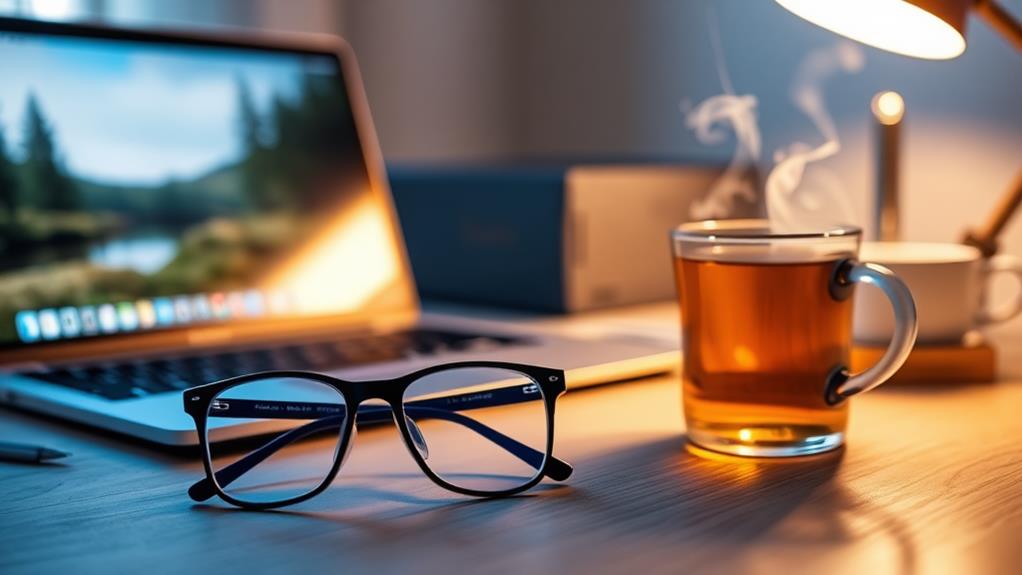
Many people find that using blue light blocking glasses offers significant benefits, particularly in today's screen-centric world. These glasses can provide eye strain relief, especially for those who spend extended hours in front of digital devices. By filtering out harmful blue light emitted from screens, they help reduce discomfort, making your visual experience more pleasant and comfortable.
One of the most notable advantages is improved sleep. Research suggests that exposure to blue light in the evening can interfere with melatonin production, disrupting your natural sleep cycle. By wearing blue light blocking glasses, you can enhance your chances of achieving restful sleep, which is essential for overall health.
In addition to better sleep, you may experience reduced fatigue. Fewer headaches and less tension in your eyes can lead to a more productive day. Enhanced focus is another benefit, as your mind can concentrate better without the distractions of discomfort. This can be particularly valuable in a work or study environment, where maintaining attention is crucial.
Moreover, using blue light glasses contributes to your digital wellness. In a world where screens dominate our daily activities, prioritizing visual comfort is important. By incorporating these glasses into your routine, you're taking a proactive step in caring for your eyes and overall well-being.
Potential Drawbacks and Misconceptions
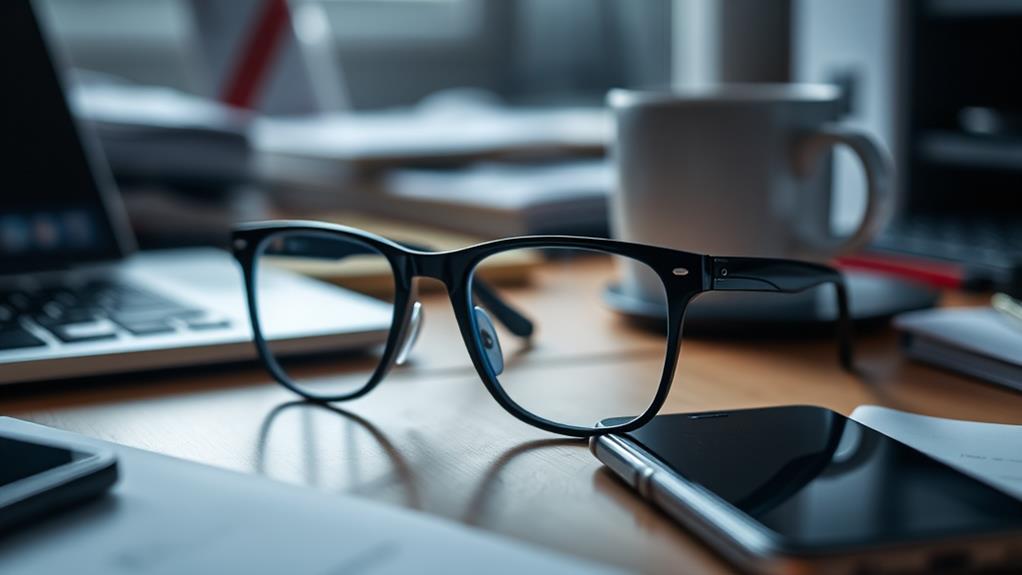
Despite the growing popularity of blue light blocking glasses, there are several potential drawbacks and misconceptions that users should consider. First and foremost, many of the claims surrounding these glasses can be misleading. While some marketing tactics suggest that wearing these glasses will completely eliminate eye strain or guarantee better sleep, the reality is more nuanced.
Here are a few key points to keep in mind:
- Limited Scope: Blue light isn't the only factor contributing to eye strain; glare, screen brightness, and duration of use also play significant roles.
- Not a Cure-All: While they may help some users, blue light blocking glasses won't replace good habits like taking breaks or adjusting screen settings.
- Variable Quality: Not all blue light blocking glasses are created equal; some may offer minimal protection despite high marketing claims.
It's essential to approach these products critically. The industry is rife with misleading claims that can lead to disappointment. You might find that some glasses marketed as "essential" don't offer the benefits you expect.
Instead of solely relying on blue light glasses, consider a holistic approach to eye health that includes proper ergonomics and regular breaks from screens. By understanding the limitations and realities of these glasses, you can make informed choices that truly enhance your well-being.
Research on Effectiveness
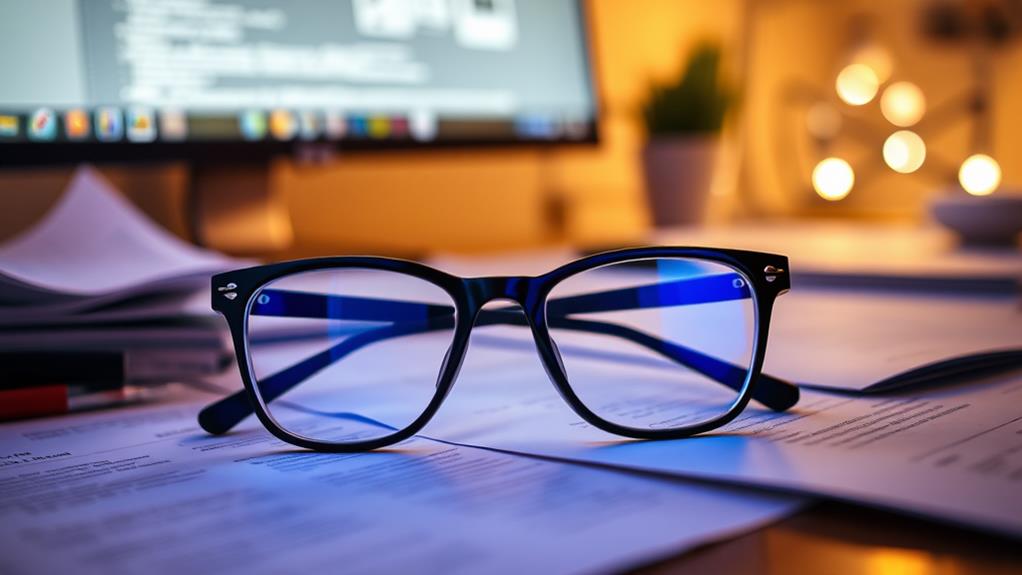
When considering blue light blocking glasses, you should examine the scientific studies that assess their effectiveness.
Research has explored their impact on eye health, including potential benefits and drawbacks, as well as user experience insights that can guide your decision.
Understanding these findings will help you determine if these glasses are a worthwhile investment for your eye care.
Scientific Studies Overview
How effective are blue light blocking glasses in reducing eye strain and improving sleep quality? Research findings suggest that these glasses can be beneficial, but the effectiveness varies based on individual circumstances and usage. Various studies have employed rigorous scientific methodology to assess their impact.
Consider the following aspects highlighted in these studies:
- Reduction in Eye Strain: Participants often report a noticeable decrease in discomfort during extended screen time.
- Enhanced Sleep Quality: Many studies indicate improved sleep patterns when blue light exposure is minimized before bedtime.
- Subjective Experiences: Users frequently express a sense of relief and comfort after incorporating these glasses into their daily routines.
While results show promise, it's crucial to approach the claims critically. Some research indicates only marginal benefits, emphasizing the importance of combining glasses with other lifestyle changes for ideal results.
Impact on Eye Health
Research findings on blue light blocking glasses extend beyond subjective experiences and touch on their potential impact on overall eye health. Studies indicate that prolonged screen time can lead to eye strain and digital fatigue, negatively affecting your visual comfort. Blue light exposure, particularly in the evening, has also been linked to sleep disruption, making it essential to take into account the long-term effects of habitual screen use.
Here's a summary of key research insights regarding blue light and eye health:
| Research Focus | Findings |
|---|---|
| Eye Strain | Blue light may exacerbate symptoms of eye strain during prolonged screen use. |
| Digital Fatigue | Users report reduced fatigue when using blue light blocking glasses. |
| Sleep Disruption | Exposure to blue light before bedtime can disrupt sleep cycles. |
| Long Term Effects | Constant screen exposure may lead to cumulative eye health issues. |
| UV Exposure | Blue light blocking lenses may not shield against UV, so additional protection is essential. |
As you become more health-aware, take into account how protecting your eyes can promote greater overall well-being in a screen-dominated world.
User Experience Insights
User experiences with blue light blocking glasses reveal a range of effectiveness that often hinges on individual circumstances and usage patterns. User reviews indicate diverse outcomes, with many users sharing their personal testimonials about how these glasses fit into their daily lives.
Consider these common insights:
- Comfort Levels: Some users find them lightweight and easy to wear for extended periods, while others report discomfort after prolonged use.
- Visual Clarity: Many users note improved visual clarity and reduced eye strain, especially during extended screen time.
- Lifestyle Impact: Feedback trends show that those who incorporate these glasses into their daily routines often experience enhanced satisfaction.
Experience comparisons among users highlight significant variations in user satisfaction based on personal preferences and usage habits. Some individuals swear by their blue light blockers, claiming they help improve sleep quality, while others see minimal changes.
It's crucial to recognize that the effectiveness of these glasses can depend on your lifestyle impact and daily screen exposure. Ultimately, understanding your unique needs and preferences can guide your choice in selecting the best blue light blocking glasses for you.
Who Should Consider Them?
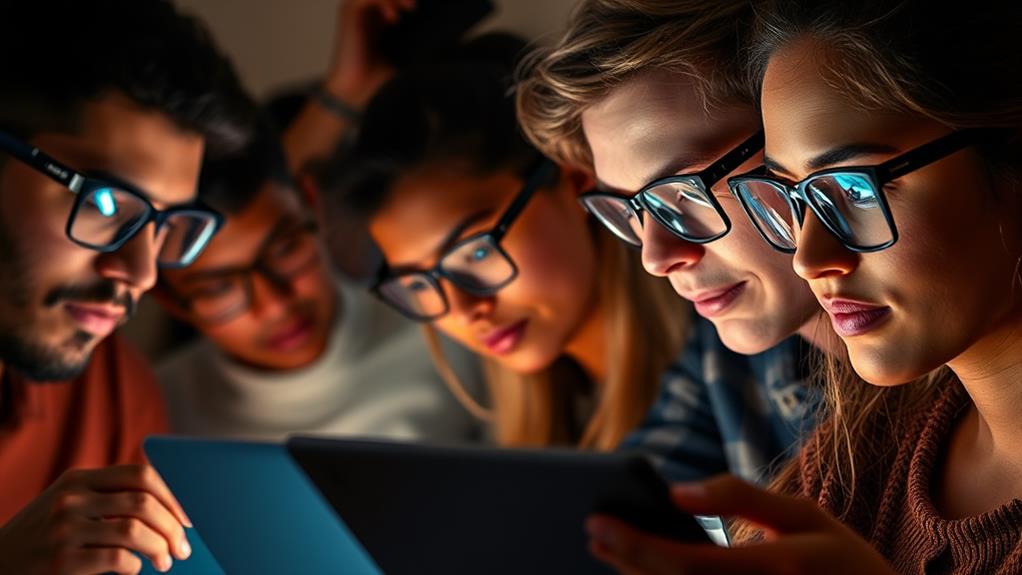
Many individuals working long hours in front of screens should consider blue light blocking glasses to mitigate potential eye strain. If you're an office worker, you likely spend your day glued to a computer, which can lead to discomfort and fatigue. Blue light filters can help reduce these symptoms, allowing you to maintain focus and productivity.
Digital nomads, who often work in varying environments, also benefit from these glasses. They can help reduce the adverse effects of artificial lighting and screen time encountered in coffee shops or co-working spaces.
Gamers, often engaged in lengthy sessions, may find that blue light blocking glasses enhance their visual comfort, allowing for prolonged gameplay without eye irritation.
Night owls, who tend to use devices late into the evening, might notice improvements in their sleep quality. By minimizing blue light exposure before bedtime, these glasses can help regulate your circadian rhythm, making it easier to unwind.
Students, frequently studying on laptops, can protect their eyes during long hours of reading and research.
Frequent travelers can also find value in blue light blocking glasses, especially when dealing with varying time zones and digital screens on flights.
Content creators and tech enthusiasts, who spend countless hours editing or coding, should consider these glasses to maintain their eye health and efficiency.
Tips for Choosing the Right Glasses
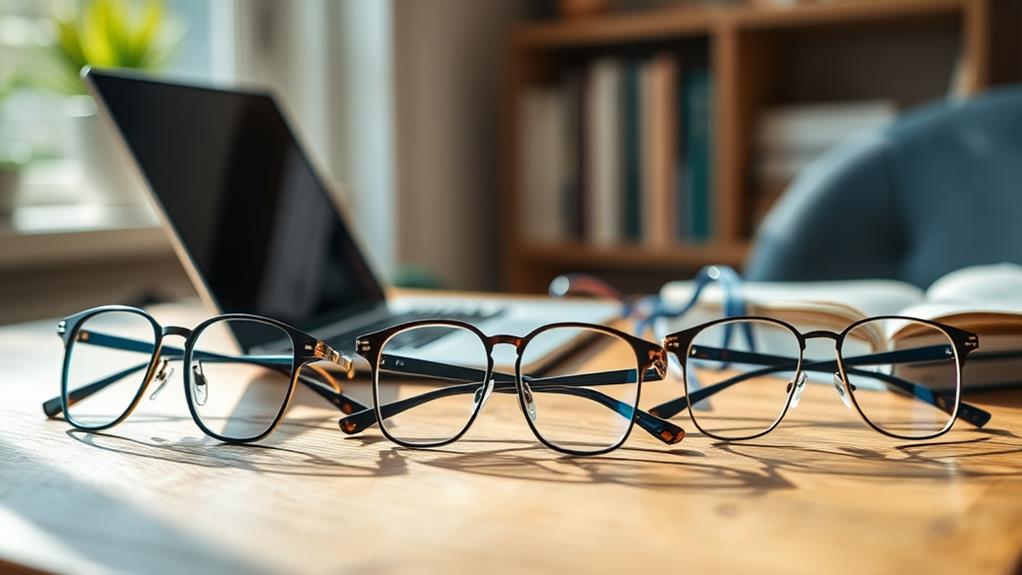
When choosing blue light blocking glasses, it's essential to take into account several key factors to guarantee you select the right pair for your needs.
First, consider the frame styles that best suit your lifestyle and personal taste. Whether you prefer classic, trendy, or sporty designs, the right frame can enhance both your comfort and confidence.
Next, pay attention to lens coatings. High-quality blue light blocking glasses often feature specialized coatings that can greatly reduce glare and enhance visual clarity. Look for lenses that offer a balance between blue light filtration and transparency, confirming you don't compromise on color accuracy.
Here are a few tips to help you make your decision:
- Frame Fit: Confirm the frames fit snugly but comfortably on your face, as a proper fit will maintain effectiveness and comfort during prolonged use.
- Lens Quality: Opt for lenses that are scratch-resistant and easy to clean, maintaining clarity over time.
- Light Filtering: Check the level of blue light filtering. Aim for lenses that block at least 30% of blue light for maximum protection.
Alternatives to Blue Light Glasses
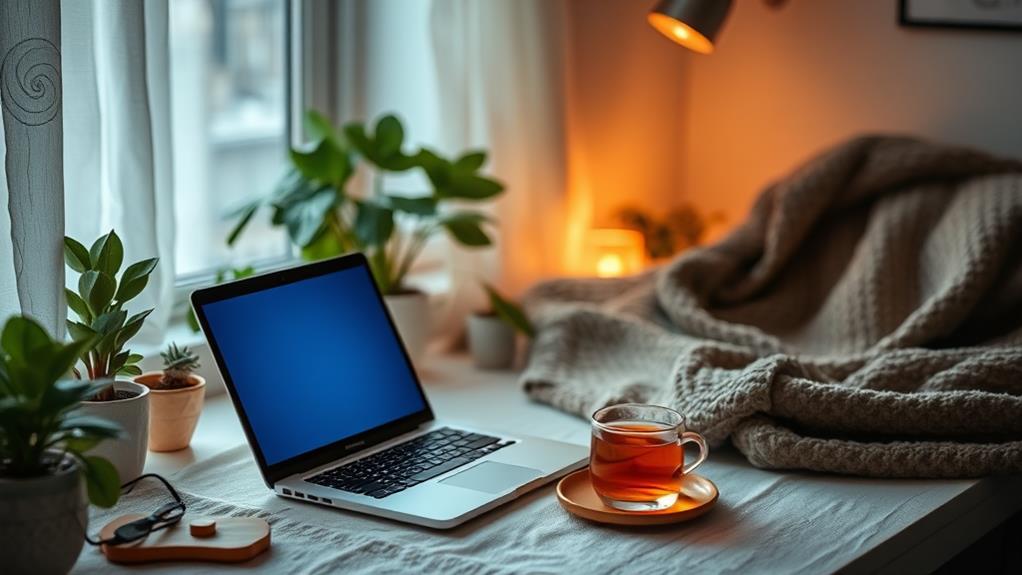
While blue light blocking glasses can be an effective solution for reducing eye strain during screen time, there are several alternatives worth considering. One of the simplest methods is to make lifestyle changes that promote healthier screen habits. For instance, try implementing a digital detox by taking regular breaks from your devices. The 20-20-20 rule is particularly useful: every 20 minutes, look at something 20 feet away for 20 seconds to relieve eye fatigue.
You can also explore alternative tools like screen filters, which can be applied directly to your devices. These filters reduce blue light exposure without altering your screen's clarity. Additionally, adjusting your lighting conditions can greatly impact eye comfort. Opt for softer, warmer lighting to create a more relaxed environment while using screens.
Ergonomic setups are essential too. Make certain your screen is at eye level and about an arm's length away to minimize strain. Incorporating mindful usage practices, such as limiting prolonged screen time and being aware of your posture, can also help.
Lastly, don't underestimate the power of eye exercises. Simple techniques, like rolling your eyes or focusing on a distant object, can strengthen eye muscles and alleviate discomfort.
Frequently Asked Questions
Can Children Wear Blue Light Blocking Glasses Safely?
Yes, children can wear blue light blocking glasses safely.
These glasses offer benefits for children, helping to reduce eye strain from screens and potentially improving sleep quality.
However, it's crucial to evaluate potential drawbacks, such as dependency on glasses instead of taking regular breaks from screens.
Encouraging healthy screen habits alongside wearing these glasses can optimize their effectiveness, ensuring your child maintains good eye health while enjoying digital activities.
How Do I Clean Blue Light Blocking Glasses Properly?
Did you know that 70% of people experience digital eye strain?
To keep your blue light blocking glasses in top shape, use gentle cleaning techniques. Start by rinsing the lenses with lukewarm water, then apply a small drop of dish soap. Wipe with a microfiber cloth, avoiding paper products that could scratch.
Are Prescription Blue Light Blocking Glasses Available?
Yes, prescription blue light blocking glasses are available. Many eyewear providers offer these options, allowing you to combine vision correction with blue light protection.
Effectiveness studies suggest that these glasses can help reduce eye strain and improve sleep quality when used during screen time.
When selecting your prescription, it's important to discuss your specific needs with an eye care professional to guarantee you find the best fit for your lifestyle and vision requirements.
Do Blue Light Glasses Come With Different Lens Colors?
Imagine wandering through a vibrant forest where each tree offers unique shade.
Similarly, blue light glasses come in various lens types, each with distinct color benefits. Yellow lenses enhance contrast and reduce glare, while clear lenses filter blue light without altering color perception.
You can choose based on your needs, whether for gaming, working long hours, or simply enjoying daily life.
Embrace the protection these options provide, ensuring your eyes feel their best!
Can I Wear Blue Light Blocking Glasses While Driving?
You can wear blue light blocking glasses while driving, but consider their impact on driving safety.
These glasses can reduce glare from screens and headlights, improving visual comfort during nighttime driving.
However, it's crucial to make certain they don't distort colors or reduce contrast considerably.
Always prioritize your safety and make sure your vision remains clear.
If in doubt, consult a professional to understand the benefits overview and make certain your driving experience is safe.
Conclusion
To sum up, blue light blocking glasses can be a valuable tool for reducing eye strain and improving sleep quality, especially for those who spend long hours in front of screens. But do you really need them? If you're experiencing discomfort or disrupted sleep, they might be worth considering. While research supports their effectiveness, choosing the right pair can make all the difference. Ultimately, whether you opt for these glasses or alternatives, prioritizing eye health is essential in our digital age.
